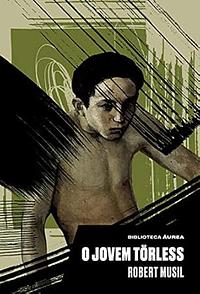Take a photo of a barcode or cover
challenging
reflective
medium-paced
Plot or Character Driven:
Character
Strong character development:
Complicated
Loveable characters:
No
Diverse cast of characters:
No
Flaws of characters a main focus:
Yes
3.8
The rare case where I'm glad to have read 400 pages of the same author's 1200 page novel before starting this 160 page book. Musil's mind clearly works better in macro.
Shocking in its way but not quite focused enough to be fully felt. All the same, it's amazing to think it was published in 1906: transgender anxieties, homoeroticism, and sexual transgressions in a book more than a century old? Incredible.
Back to the 1200 page behemoth, then.
The rare case where I'm glad to have read 400 pages of the same author's 1200 page novel before starting this 160 page book. Musil's mind clearly works better in macro.
Shocking in its way but not quite focused enough to be fully felt. All the same, it's amazing to think it was published in 1906: transgender anxieties, homoeroticism, and sexual transgressions in a book more than a century old? Incredible.
Back to the 1200 page behemoth, then.
challenging
slow-paced
Plot or Character Driven:
Character
Strong character development:
Complicated
Loveable characters:
No
Diverse cast of characters:
No
Flaws of characters a main focus:
Yes
challenging
dark
emotional
reflective
medium-paced
Plot or Character Driven:
Character
Strong character development:
No
Loveable characters:
Complicated
Diverse cast of characters:
N/A
Flaws of characters a main focus:
N/A
challenging
dark
reflective
medium-paced
This book describes Törless - a boy at boarding school - and his coming to terms with the onset of puberty and encountering "sensuality" for the first time by taking part in ruthlessly bullying and raping a fellow pupil who he and his friends caught steeling.
According to the introduction, German military schools at the turn of the twentieth century were ruthless places where such behaviour was not uncommon. Rainer Maria Rilke, for instance, once commented that he was reminded of his time attending the same school as the Young Törless upon reading Dostoevsky's description of being in a Siberian prison camp in Notes from a Dead House. So the shocking nature of the material is in itself not a reason to view the book negatively.
What is a reason to dislike the book, however, is just how tedious and pretentious it is. Around the distressing - thought somewhat parenthetical - descriptions of a boy being mentally and sexually abused, we are treated to tiresome discussions of philosophy as Törless grapples with philosophical questions like how do we articulate in words deep and dark feelings, or what are imaginary numbers (no doubt a tired metaphor for the boy's struggles but one I don't have any interest in decoding).
It's all so much a representation of Törless' growth, but it is painfully dull, utterly banal and not at all as sophisticated or "intellectual" as the introduction claims. Nor is it a view into "dictatorial attitudes that prefigure the outbreak of ... fascism" as the blurb suggests. It is, simply put, a poor description of some teenage mental turbulence grafted onto some pretty thinly drawn characters enmeshed in a disturbing story of abuse.
The book does have some insightful lines that just lift it out of the dread 1-star category: for example, when discussing why banal literature can be useful for young people, Musil amusingly comments that it can carry them "over the dangerous, soft emotional ground of those years during which one has to mean something to oneself and is yet still too much of an unfinished article really to be anything." This and a few more gems besides managed to grab my interest for a passing second but unfortunately it was too little to salvage the work.
In sum, I can see why I had never heard of this book before I picked it up in a three for two offer, had not heard of Robert Musil and am thoroughly grateful the book was so easy and quick to get through.
According to the introduction, German military schools at the turn of the twentieth century were ruthless places where such behaviour was not uncommon. Rainer Maria Rilke, for instance, once commented that he was reminded of his time attending the same school as the Young Törless upon reading Dostoevsky's description of being in a Siberian prison camp in Notes from a Dead House. So the shocking nature of the material is in itself not a reason to view the book negatively.
What is a reason to dislike the book, however, is just how tedious and pretentious it is. Around the distressing - thought somewhat parenthetical - descriptions of a boy being mentally and sexually abused, we are treated to tiresome discussions of philosophy as Törless grapples with philosophical questions like how do we articulate in words deep and dark feelings, or what are imaginary numbers (no doubt a tired metaphor for the boy's struggles but one I don't have any interest in decoding).
It's all so much a representation of Törless' growth, but it is painfully dull, utterly banal and not at all as sophisticated or "intellectual" as the introduction claims. Nor is it a view into "dictatorial attitudes that prefigure the outbreak of ... fascism" as the blurb suggests. It is, simply put, a poor description of some teenage mental turbulence grafted onto some pretty thinly drawn characters enmeshed in a disturbing story of abuse.
The book does have some insightful lines that just lift it out of the dread 1-star category: for example, when discussing why banal literature can be useful for young people, Musil amusingly comments that it can carry them "over the dangerous, soft emotional ground of those years during which one has to mean something to oneself and is yet still too much of an unfinished article really to be anything." This and a few more gems besides managed to grab my interest for a passing second but unfortunately it was too little to salvage the work.
In sum, I can see why I had never heard of this book before I picked it up in a three for two offer, had not heard of Robert Musil and am thoroughly grateful the book was so easy and quick to get through.
No rating. If you are an adolescent male struggling with your sexuality but also addicted to Nietzsche, I have found you the novel of your dreams. "The Confusions of Young Törless" is one of the earliest works of gay fiction (before "gay fiction" was really a genre) and I assign it no rating because although I did not particular enjoy it, I do not want to undermine its significance! The book itself is deeply philosophical, in a rather precious (and hard to follow) way that mixes layers of psychology and morality and political allegory. In short, it provides endless material for 1,000+ college essays but as a general read it was more of a slog. That said, the inner torment of Törless feels real when you get past the intellectual language and you can sense the author's own struggles coming through the page.
Creo que leí este libro cuando aún no estaba preparada para hacerlo. Y aún así me impresionó. Tengo que releerlo porque estoy convencida que ahora aún me impresionará/gustará más.
dark
sad
medium-paced
Strong character development:
Yes
Loveable characters:
Complicated
Diverse cast of characters:
N/A


